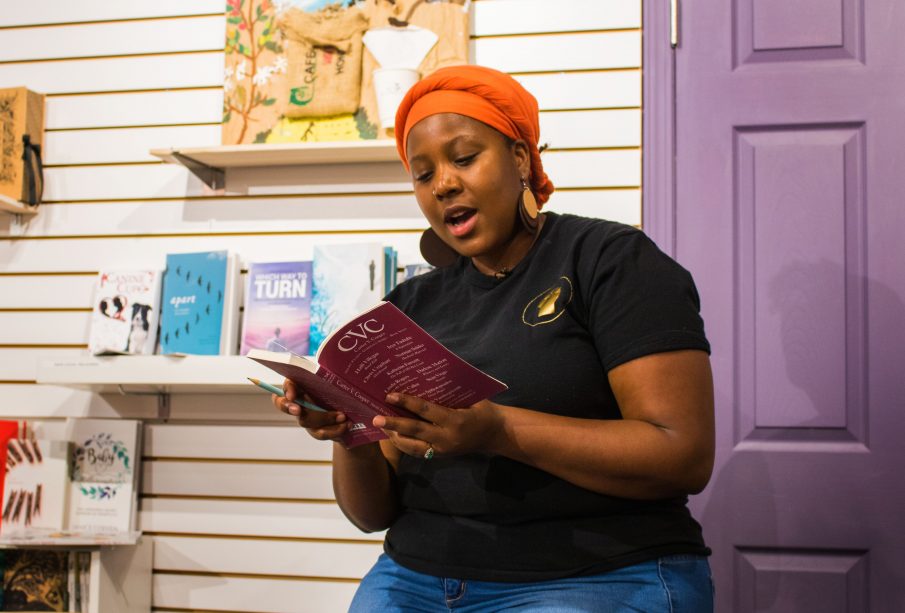Regina Writer shortlisted for prestigious prize

Local writer Iryn Tushabe honoured in an intimate gathering at The Penny University.
On the evening of July 16, the beginning of the second heat wave of the month, a few of us gather at The Penny University for an intimate reading by AKO Caine Prize shortlist nominee Iryn Tushabe. The AKO Caine Prize for African Writing is awarded to an African writer of a short story published in English, with the “aim to bring writing to a wider audience using [the] national literary award.”[1] Tushabe, a graduate of the University of Regina, has been published in local publications Grain and Briarpatch Magazines for short fiction and creative non-fiction, anthologized in Journey Prize Stories 30, and has won the City of Regina Award in 2020 for her upcoming debut novel, tentatively titled Everything is Fine Here.
Tushabe reads us an excerpt from her story “A Separation,” published in EXILE Quarterly, from a stool tucked in the corner of the shop. She is framed by a colourful display of other local author’s books, a vibrant purple door, just like the one in her story, and a clock that reads, “So many books, So little time!” The reading, and following conversation with fellow Regina writer Trevor Herriot, were also livestreamed to Facebook due to limited space for the event.
Herriot, whose fifth book, Towards a Prairie Atonement, was released in 2016 from The University of Regina Press, worked with Tushabe on her earlier drafts of the story as Writer in Residence at the Regina Public Library. He says that in that position, “you look for those diamonds in the rough, the ones who are really a pleasure to work with,” and that Tushabe certainly is of that sort. Their ensuing conversation unravelled with the cozy familiarity of mentor and mentee.
Tushabe’s story was written in 2018, and she notes that the award nomination has allowed her to “rediscover the story.” She is excited “to have it exposed Ugandan audiences,” as she feels primarily recognized as a Canadian writer. “The Ugandan literary community doesn’t know anything about me,” she says with a laugh, “so it’s been wonderful to make that connection.”
“There’s a lot of Harriet in me,” Tushabe says of her main character, who is skeptical and pragmatic, but emphasizes the importance and contrast of the grandmother character, who is very spiritual. She notes that “since becoming a writer, [she has learned that] you can’t always be super confident about what you know. Because a world that has no contradictions, that has no doubts… that’s not very believable in literature. The tension you have [in your work] comes from that.”
Harriet’s grief comes from a very personal place, in that Tushabe’s grandmother also passed away while she was studying at the University here, and she was unable to go home for the funeral. It started as a creative non-fiction piece, but she was unable to separate it from her own grief. Fictionalizing it created distance that helped bring the piece to life.
“Fiction can lend itself so easily and fully to truth telling in a way that non-fiction limits sometimes. So that the moment I started fictionalizing it, it became way more personal,” she says. She acknowledges the inherent contradiction present in that statement – that somehow, something could be “more personal when fictionalized,” but as she said earlier, literature without contradiction isn’t very good literature.
From what Tushabe says, the spiritual tension of the story seems to resemble that of Uganda. The deity she features in her story, Nyabingi, which “directly translated into [her] language means ‘Goddess of Plenty’ or ‘abundance,’” also features prominently in many stories in Ugandan oral tradition. She tells us that growing up in rural Uganda, a place “where there is no television, no electricity,” her family would tell each other stories. “We would have heard these stories from my dad, who heard it from his dad. The stories are fluid,” Tushabe says. “They mutate over time, [and] people embellish,” except, that “after colonialism, when missionaries come into the country,” such deities were deemed “savage,” and their stories washed over – but not completely. She notes that though “Uganda is a largely Christian country now, some people still follow [Nyabingi].”
On the character of Ganesh, a man from India who helps Harriet home when she gets lost in a storm, she says she “didn’t know until the moment of knocking on the purple door who would open it,” but it made sense. As an immigrant herself, she says that the connection is always there when you meet someone else who is. “You may not talk to them, or may just nod in their direction, but there’s this sense that perhaps this person knows what it’s like to leave a whole way of life behind.” Here, the story once again emphasizes that even in these harsh separations, closeness can be found.
On her process, Tushabe says that she gets a sense of a character first, who they are and she “sits with them for a while, doesn’t start writing right away […] the character directs [her] where the story wants to go.” Then, she touches her temple and smiles humbly, in a way that indicates she is about reveal an important trade secret. “I’m going to say something that’s absolutely bizarre, and people may roll their eyes at,” she says animatedly. “I think that the early draft of a thing is the story teaching you how to tell it… kind of checking to ensure that you’re the sort of person who can tell this story, [and] it teaches you how to tell it […] if you’re open enough, and not rushing.”
She speaks a bit about what we can expect from her debut novel, tentatively titled Everything is Fine Here. The novel follows a young woman, and “focuses on the moment she decides to step outside of her Christian upbringing and cultural upbringing to stand in solidarity with her much older sister who is gay. I don’t know if you know,” she tells us, “But it’s illegal really, to be gay in Uganda.” She notes the novel is set in Uganda, but the main character has been to school in Canada and “is more confident about being more open and this causes issues in the family.”
The question on everyone’s mind, of course, is how to make the perfect lemongrass tea – an essential element of her story. When asked, Tushabe lights up, and is excited to tell us that the lemongrass we get here is different. The secret, of course, is to get some from her, which she really does pack in a Ziploc bag and bring from Uganda.
On July 26 at 10 a.m. Regina time, the AKO Caine Prize was given through a virtual Award Ceremony to Meron Hadero for her story “The Street Sweep,” originally published in ZYZZYVA. Hadero is from Ethiopia and has studied and published work in the United States. She is the first Ethiopian writer to win the prize since its inception in 2000.[2] The shortlist included great works by five talented writers from a variety of nationalities who reside in countries all over the world, and I think I speak for all of Regina when I say we are honoured and proud for Iryn Tushabe to have been among them – and that we can’t wait to see what she does next.
[1] From the “About” section of the AKO Caine Prize website: http://www.caineprize.com/about .
[2] From the AKO Caine Prize website, http://www.caineprize.com/.








